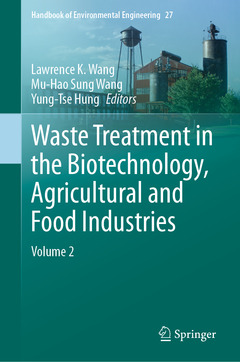Description
Waste Treatment in the Biotechnology, Agricultural and Food Industries, 1st ed. 2024
Volume 2
Handbook of Environmental Engineering Series, Vol. 27
Coordinators: Wang Lawrence K., Sung Wang Mu-Hao, Hung Yung-Tse
Language: English
Subjects for Waste Treatment in the Biotechnology, Agricultural and...:
433 p. · 15.5x23.5 cm · Hardback
Description
/li>Contents
/li>Biography
/li>Comment
/li>
This book and its sister book (Volume 1 ) of the Handbook of Environmental Engineering (HEE) series have been designed to serve as a mini-series covering waste treatment in biotechnology, agricultural and food industries . It is expected to be of value to advanced undergraduate and graduate students, to designers of sustainable biological resources systems, and to scientists and researchers. The aim of these books is to provide information on bio-environmental engineering, and to serve as a basis for advanced study or specialized investigation of the theory and analysis of various agricultural and natural resources systems.
Volume 2 covers topics on: (a) application of secondary flotation-filtration and coagulant recycle for improvement of a pulp mill primary waste treatment facility; (b) management of solid and hazardous wastes; (c) microbial enzymes for wastewater treatment; (d) a multi-criteria approach to appropriate treatment technology selection for water reclamation; (e) chemicals used in agriculture: hazards and associated toxicity issues; (f) biochar for adsorptive removal of pharmaceuticals from environmental water; (g) treatment of palm oil mill effluent; (h) treatment and management of solid waste by incineration; (i) technologies for removal of volatile organic compounds (VOC) from industrial effluents and/or potable water sources; (j) treatment of healthcare waste.
Chapter 1: Application of Secondary Flotation-filtration and Coagulant Recycle for Improvement of A Pulp Mill Primary Waste Treatment Facility.- Chapter 2: Management of Solid and Hazardous Wastes.- Chapter 3: Microbial Enzymes for Wastewater Treatment.- Chapter 4: A Multi-criteria Approach to Appropriate Treatment Technology Selection For Water Reclamation.- Chapter 5: Chemicals Used In Agriculture: Hazards and Associated Toxicity Issues.- Chapter 6: Biochar For Adsorptive Removal of Pharmaceuticals From Environmental Water.- Chapter 7: Treatment of Palm Oil Mill Effluent.- Chapter 8: Treatment and Management of Solid Waste By Incineration.- Chapter 9: Technologies For Removal of Volatile Organic Compounds (voc) From Industrial Effluents and/or Potable Water Sources.- Chapter 10: Treatment of Healthcare Waste.
Lawrence K. Wang has served the society as a professor, inventor, chief engineer, chief editor and public servant (UN, USEPA, New York State) for 50+ years, with experience in entire field of environmental science, technology, engineering and mathematics (STEM). He is a licensed Professional Engineer (NY-MA-NJ-PA-OH), a certified Laboratory Director (NY-MA-RI) , a licensed Water Operator (MA-NY), and an OSHA Hazardous Waste Management Instructor. He has special passion, and expertise in developing innovative technologies, educational programs, licensing courses, international projects, academic publications, and humanitarian organizations, all for his dream goal of promoting world peace. He is a retired Acting President/Professor of the Lenox Institute of Water Technology, USA, a Senior Advisor of the United Nations Industrial Development Organization (UNIDO), Vienna, Austria, and a former professor/visiting professor of Rensselaer Polytechnic Institute, Stevens Institute of Technology, University of Illinois, National Cheng-Kung University, Zhejiang University, and Tongji University. Dr. Wang is the author of 750+ papers and 50+ books, and is credited with 29 invention patents. He holds a BSCE degree from National Cheng- Kung University, Taiwan, ROC, a MSCE degree from the University of Missouri, a MS degree from the University of Rhode Island and a PhD degree from Rutgers University, USA. Currently he is the book series editor of CRC Press, Springer Nature Switzerland, Lenox Institute Press, World Scientific Singapore, and John Wiley. Dr. Wang has been a Delegate of the People to People International Foundation, a Diplomate of the American Academy of Environmental Engineers, a member of ASCE, AIChE, ASPE, WEF, AWWA, CIE and OCEESA, and a recipient of many US and international engineering and science awards.
Mu-Hao Sung Wang has been an engineer of the New York State Department of Environmental Conservati




